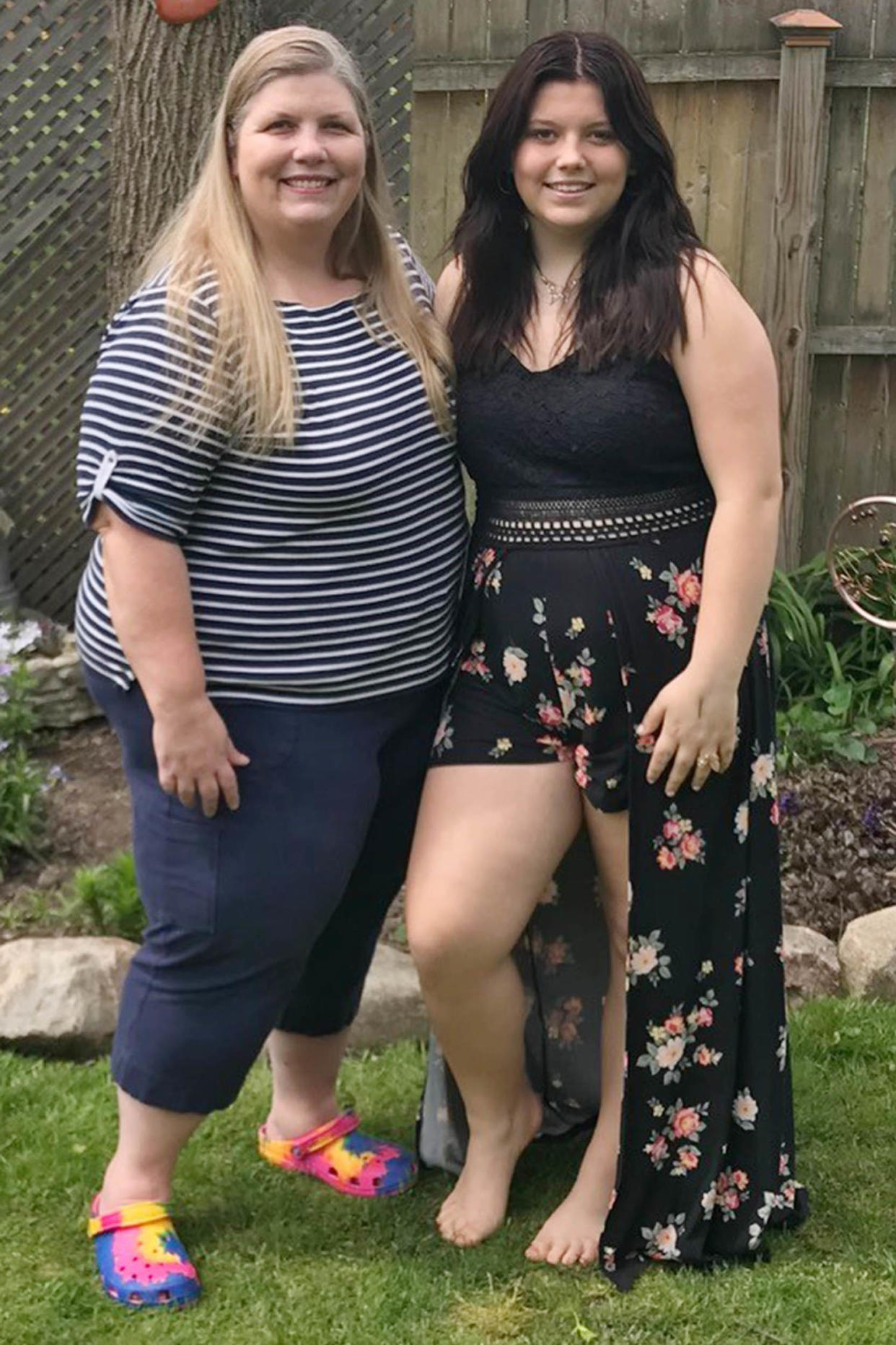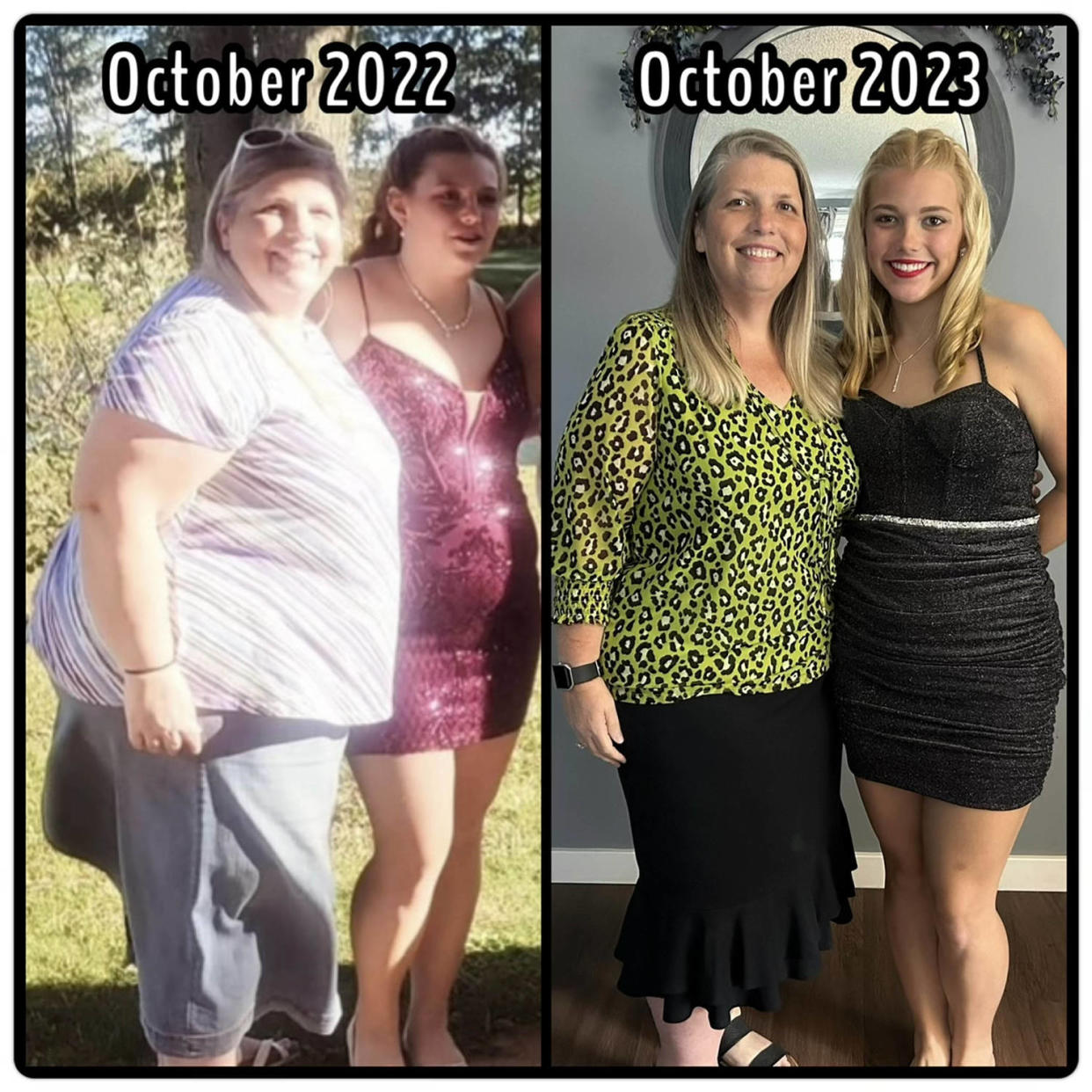Thousands of weight loss drug prescriptions have been written for kids: 1 teen speaks out
This story discusses eating disorders. If you or someone you know has an eating disorder, call the National Eating Disorder Association at (800) 931-2237 or visit the website for a live chat. If you’re in crisis, text “NEDA” to 741741 to talk with someone at the crisis text line.
Demi Buckley, 16, has always been active. She played volleyball for three years, basketball for two years, cheered for two years and has been in marching band for four years. Despite exercising routinely, she carried extra weight.
“When I started my period and then all of the hormones hit, that’s when I started gaining weight really fast,” she tells TODAY.com. “I came back to school, and I was a lot bigger than all the girls my age.”

Her mom, Deana Buckley, hoped to foster body positivity in Demi.
“I’ve always tried instilling, ‘No matter what size you are, you’re still beautiful,’” Buckley, 51, from Michigan, tells TODAY. “‘Size is not the indicator of who you are as a person. Your character is.’ And that’s hard to make your child believe that when you have the cool kids at school saying mean things and making them feel otherwise.”
Last year, Demi weighed 198 pounds at 5 feet, 5 inches tall and was considered to have obesity. She started taking weight-loss drug Wegovy. She now weighs 140 pounds. She wanted to share her experience taking this type of medication — known as GLP-1 agonists because they mimic the hormone GLP-1 — to help others understand what it’s like.
“I feel like if I reach out and show others that this medication can help them or this even is a thing — because a lot of people don’t know about it — it could really save someone’s life,” Demi says.
‘Constantly thinking about food’
After Demi started gaining weight in fifth grade, the bullying began. Classmates called her fat and told her to eat salad. She would meal plan and exercise at a local gym, in addition to the various sports she played. Still, she always weighed more than her peers. Demi began feeling frustrated, depressed and anxious.
“I could not lose the weight no matter how hard I tried,” Demi recalls. And she was “constantly thinking about food.”
“I couldn’t wait to get home, and as soon as I got home, it was like 3 and I was asking my mom what was for dinner,” she says. “(I) always wanted to eat.”

Demi started purging, thinking that could help her lose weight. She also began self-harming. It felt difficult for Buckley to watch her daughter suffer, and she soon got Demi help.
“Our children face a lot of obstacles that I never had to face as a child. They go through a lot of the things that social media brings on very quickly and very early in life,” Buckley says. “In sports, she had to struggle to fit in and worked twice as hard because of her weight.”
Six years ago, Buckley enrolled Demi in eating disorder recovery, and the teen started taking medication for anxiety and depression. These treatments helped her thrive in many ways.
“Demi has coping mechanisms now that she’s gone through with therapy,” Buckley says. “She’s blossomed in so many aspects.”
Buckley can personally relate to her daughter's struggle as she's also grappled with her weight. About 20 years ago, she underwent gastric bypass surgery, which helped her go from 300 to 190 pounds. But after having children and going through a hysterectomy and menopause, Buckley regained weight.
Recently, she developed large blood clots in her legs, and her doctor prescribed Mounjaro, which mimics GLP-1 and another hormone called GIP. The medication, made by Eli Lilly, is approved to treat Type 2 diabetes and also induces weight loss. At first, Buckley felt wary about taking Mounjaro, but she learned more about the medication and decided to try it.
“I have been white-knuckling it my whole life — dieting, exercising — and I struggled,” she says. “(I wouldn't be) hungry, but I’m thinking about food constantly.”
She began taking the medication in October 2022 and experienced “phenomenal results” with it, she says. At the time, she was already eating a healthy diet, and her doctor thought this medication could make it easier for her to lose weight.
“I still have a long way to go because I went from 366 … to 235 now,” she says. “I’ve had my limitations also in my exercising because of the blood clots.”

When Wegovy was approved by the U.S. Food and Drug Administration for use in 12- to 18-year-olds, Demi asked her mom if she thought it could work for her.
“I researched it,” Buckley says. “(I said), ‘Let’s talk to the doctor and see.’”
They talked candidly with their family doctor, and Buckley shared what having something like this as a teen would have meant for her.
“Had this type of medication been out, it could have been a life changer for me,” she recalls saying.
Demi started taking the medication in March 2023. She’s noticed she has fewer food cravings. Like others on the medications, Demi experienced some side effects, including stomach pain.
“My stomach hurts really bad unless I eat something,” she says. “I would always end up throwing up after we did … endurance or cardio.”
She started taking another medication to treat her nausea and vomiting. Also, she notices she feels thirsty a lot. As first-chair clarinet in band, she needs play the loudest so the others can follow, and often she's parched.
“Unless you’re keeping up with your water, you’re going to get dehydrated very quickly, which has caused me to be dizzy,” Demi says.
Buckley tries to remind Demi that her diet on Wegovy should include protein, vegetables and plenty of water to reduce some of the unpleasant side effects.
“(Demi's) like, ‘Well to be honest I probably haven’t been drinking as much as I should,’” Buckley says. “I said, ‘Well, you know that big expensive Stanley cup that you’ve got right there, you’re supposed to be drinking at least a couple of those a day.”
According to Novo Nordisk, the maker of Wegovy, some of its most common side effects include stomach pain, nausea, vomiting and dizziness, as Demi experienced. The drug company also notes on its website that diarrhea and vomiting can lead to dehydration, so it's important for those taking Wegovy to drink lots of fluids.
Buckley believes the medication is a “good tool,” but that people, and teens especially, taking it need to still adhere to good habits.
“You’ve got to make sure you’re creating those healthy lifestyles and habits of eating,” she says. “Make sure you’re getting a well-balanced meal, so your body is being nourished.”
How do GLP-1 agonists, like Wegovy, work?
GLP-1 receptor agonists “mimic GLP-1 ... which is a hormone secreted by the (gastrointestinal) tract,” Dr. Robert Siegel, director of Cincinnati Children’s Center for Better Health and Nutrition, tells TODAY.com. (In the past, Siegel received research funds from Vivus, which makes Qsymia, a weight-loss medication that is not a GLP-1 agonist.)
GLP-1 agonist medications cause the pancreas to release insulin, which helps control blood sugar, and they slow your gastrointestinal tract down, making you feel full longer and reducing hunger, he explains.
“They also have some central effects on the brain that seem to lower your hunger, as well,” Seigel, who is not involved in Demi’s care, adds. “We hear all the time that our patients stopped thinking about food.”
GLP-1 agonists “were really developed initially for the treatment of diabetes, but it became apparent pretty quickly that they can also cause weight loss,” he says.
According to Novo Nordisk, the most commonly reported side effects of Wegovy are:
Nausea
Diarrhea
Vomiting
Constipation
Stomach pain
Headache
Fatigue
Upset stomach
Dizziness
Bloating
Gas
Stomach flu
Heartburn
Runny nose or sore throat
“These medications are to be taken very seriously," Siegel says.
Weight-loss medications and teens
At the start of 2023, the American Academy of Pediatrics (AAP) released its first new guidelines in 15 years on evaluating and treating childhood obesity. The U.S. Centers for Disease Control and Prevention estimate that almost 15 million children and teens have obesity.
The guidelines advise treating children with obesity as soon as it's identified with the appropriate intensity based on severity and the child's overall health, TODAY.com previously reported. In the past, a watchful waiting approach was recommended in case the child grew out of having obesity, but more research has shown that this isn't as common as was thought.
PurpleLab, a health care analytics platform, estimates that in 2023, 4,000 prescriptions for semaglutide, the active ingredient in Wegovy and Ozempic, were prescribed to kids between 12 and 17.
The new guidelines still prioritize lifestyle changes, but they also say weight-loss medications should be offered in addition to children over 12, when the balance of risks and benefits makes sense.
Dr. Christopher Bolling, former chair of the section on obesity at the AAP, helped write the new guidelines after he and his co-authors reviewed the data on GLP-1 medications and children.
“We were all stunned when the data came back pretty clearly saying that, for certain kids, these medications can really have a beneficial health effect,” Bolling, who is not involved in Demi’s care, tells TODAY.com. “They have side effects, but on balance, the positives of the health effects outperformed the risks.”

Bolling, who practiced adolescent obesity medicine for more than 20 years before retiring, says that, starting in the late 1990s, doctors noticed an “explosion of obesity prevalence” in kids. At first, there wasn’t a lot of data on obesity treatments for youth, but as time went on, more studies were published.
The update in last year's guidelines "really makes sound recommendations based on evidence," he says.
“There was this realization that, while obesity is not something that is a person’s fault or a value judgement about their willpower or anything else, obesity has significant health risks associated with it, and we should treat it like we do other chronic illnesses,” he adds.
Some children with obesity develop high blood pressure, Type 2 diabetes, sleep apnea and other complications, and these children might benefit from having their obesity treated, Bolling says. Insurance companies usually cover the cost of the medication if a child has a condition like Type 2 diabetes, the experts note. But it's not routinely covered for weight loss alone.
“If it’s for obesity, you may need your doctor to make the case to your insurance company,” Dr. Amanda Velazquez, director of Obesity Medicine at Cedars Sinai, and paid consultant for Novo Nordisk and Eli Lilly, both makers of weight loss medications, told NBC’s Vicky Nguyen in a TODAY segment aired Feb. 20. “Without insurance these meds run about $1,000 a month.”
When the guidelines came out last year, there was criticism around the belief that they continue to emphasize weight loss over health and create unnecessary shame for kids, according to nonprofit Mental Health America.
But Bolling says he and his co-authors thought a lot about weight bias in medicine when crafting the recommendations.
“We really want to help pediatricians and providers know that really focusing on health, we think, is a better way to go,” he says. “No one benefits from weight bias.”
Another common criticism of the guidelines was that they could promote disordered eating in kids, NBC News reported.
The Collaborative of Eating Disorder Organizations wrote an open letter to the AAP, which said in part: "The statements throughout these guidelines are problematic at best, and at worst, put American children and adolescents at serious risk for developing eating disorders, disordered eating, and other mental and physical health issues."
Bolling says he’s unaware if there is a relationship between GLP-1 agonist medications and eating disorders but acknowledges more research needs to be done on this topic.

What about lifestyle changes?
Bolling stresses that the guidelines say the medications aren’t to be used alone and should be accompanied with lifestyle changes.
“You never do medications as monotherapy,” he says. “(Not) everybody who’s at this weight status (needs) to go home with a prescription, but they need to not avoid the discussion either.”
As someone who has prescribed weight-loss medications to adolescents, Seigel emphasizes that his first intervention always involves “intensive lifestyle management.”
“If that works, it may very well be a safer route," he explains. "There’s also reason to believe with lifestyle improvement — which includes better sleep, eating better and exercise — you might wind up in a healthier state than just weight loss with the medications."
If lifestyle modification doesn’t work and parents are interested, he sometimes prescribes medication.
“It depends on what the family wants and what they’ve tried, what’s working and what’s not,” he says. “The patients that we take care of, our goal is not specifically weight loss. Our goal is better lifestyle and better health.”
Research shows that most people who stop taking the medications gain most of the weight back, meaning that most people need to keep taking the medications to see results, TODAY.com previously reported. But whether the average adolescent taking the medication will need to keep taking it for decades to maintain their health is unclear, both experts say.
“If you’ve got diabetes and you go on these medications for diabetes, you’re probably going to stay on these medications,” Bolling explains. “Once you start on these medications for chronic disease, you need to go in with your eyes open, (thinking), ‘I maybe have the ability to come off of it, but ... I’m managing a chronic disease and that chronic disease is not going away, so I may be on it for life.’”
Critics of giving adolescents weight-loss medications also point to the lack of long-term data.
“These are medications that are potentially helpful for health, but ... we don’t have 40 years of experience with (them), so you have to balance your risk (and) benefit," Bolling says.
Sharing her story
Demi doesn’t want to lose any more weight, and she’s been talking to her doctor about next steps.
“This is where I want to be,” she says. “This is usually a lifelong medicine that you take. We’ve talked about me going down (on dosage) so that I’m maintaining the weight. It’s also helping with the hunger and all the mental stuff.”

Demi's focused now on building muscle while maintaining her weight loss. She feels more confident these days.
“I’ve always been dependent on antidepressants, and being on this medicine, I feel like I don’t need to be on antidepressants,” Demi told Nguyen. “Now that I’m confident in my body … I can be confident in my mind.”
Demi has noticed that some of the people who used to bully her are suddenly nice to her — a frustrating development.
“It made me so mad,” she says. “I don’t get how someone could something (mean) and then a couple months later act like they never said anything just because I’m skinny now.”
Some people on social media think that by sharing her daughter’s experience, Buckley is “exploiting” Demi, the mom says.
“We want to advocate, to let people know this is a serious medication that can seriously help you if you get educated about it and it’s used under the proper supervision," Buckley explains. "It can be something awesome."
This article was originally published on TODAY.com
